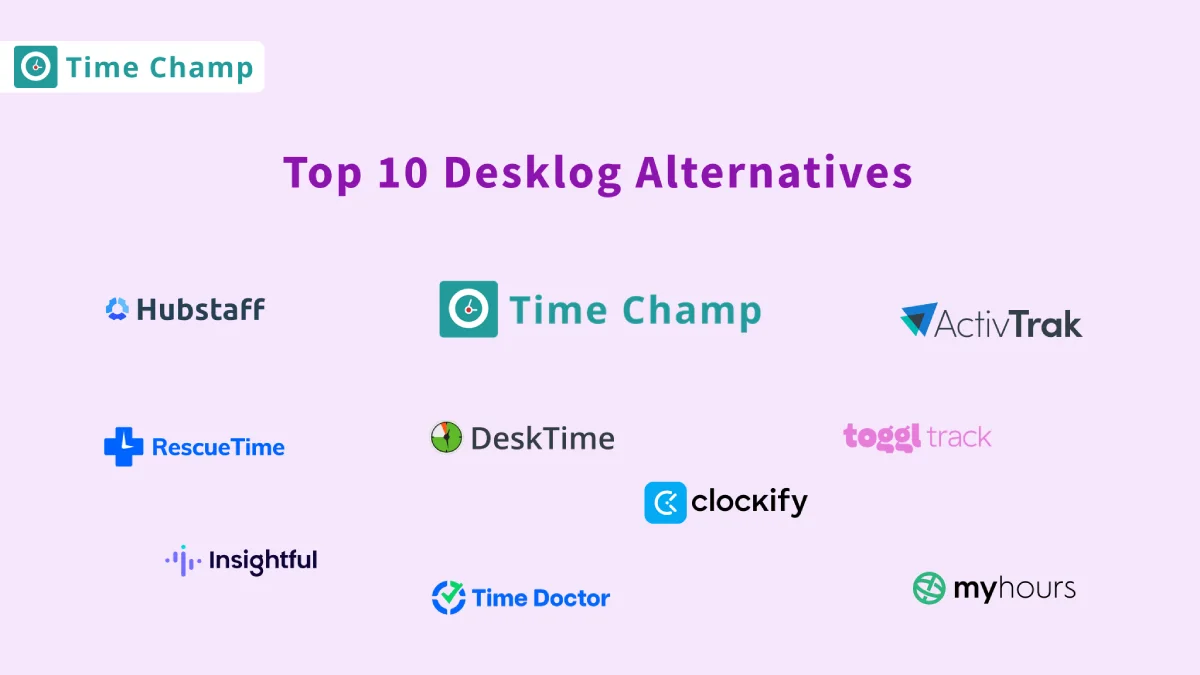Still using Desklog but thinking if there's something better out there?
You are not alone. With the expansion of teams and the increase in expectations, people are no longer satisfied with simple time tracking; they want something more intelligent, something that is quicker, more adaptable, and more aligned with the way modern teams operate.
You do not need to compromise for the tools offering only basic features. It can be more powerful insights, a better user experience, or functionality that meets your workflow, but there is certainly no lack of options to explore. Want to upgrade? These are the top 10 alternatives to Desklog to use in 2025.
Why Look for Alternatives to Desklog?
Although Desklog has some basic time tracking and productivity features, many teams are now experiencing its limitations. Its reports are less flexible, UI is clunky, lacks integrations, and it does not allow much customization, which can be a problem supporting today's working style of teams. With companies expanding or switching to hybrid and remote work environments, the demand for more intelligent and flexible tools becomes difficult to overlook. That is why so many are looking into alternatives, not only to time tracking, but also to increasing productivity, visibility, and overall team performance.
Key Features of Desklog
- Automated time tracking
- Productivity and activity monitoring
- Task and project management
- Attendance and timesheet management
- Invoice and billing support
- Cross-platform availability
Limitations of the Desklog
- Limited reporting customization: Users can’t fully customize reports to specific team or project needs.
- Slightly outdated user interface: The design feels clunky and less intuitive compared to modern tools.
- Minimal manual time entry options: Offers limited flexibility for editing or adding time entries manually.
- Occasional lag with large teams: Performance may slow down when dealing with larger datasets or teams.
- Basic mobile app functionality: The mobile version lacks many features that are available in the desktop app.
Quick Comparison of Desklog Alternatives
Looking for a better time tracking and productivity tool than Desklog? Here’s a quick side-by-side look at the top alternatives to help you choose the right fit for your team.
| Software | Key Features | Pricing | Ratings |
|---|---|---|---|
| Time Champ |
|
|
|
| Hubstaff |
|
|
|
| Toggl Track |
|
|
|
| Clockify |
|
|
|
| Time Doctor |
|
|
|
| ActivTrak |
|
|
|
| DeskTime |
|
|
|
| Insightful |
|
|
|
| RescueTime |
|
|
|
| My Hours |
|
|
|
Best Desklog Alternatives That Deliver More Value and Control
1. Time Champ
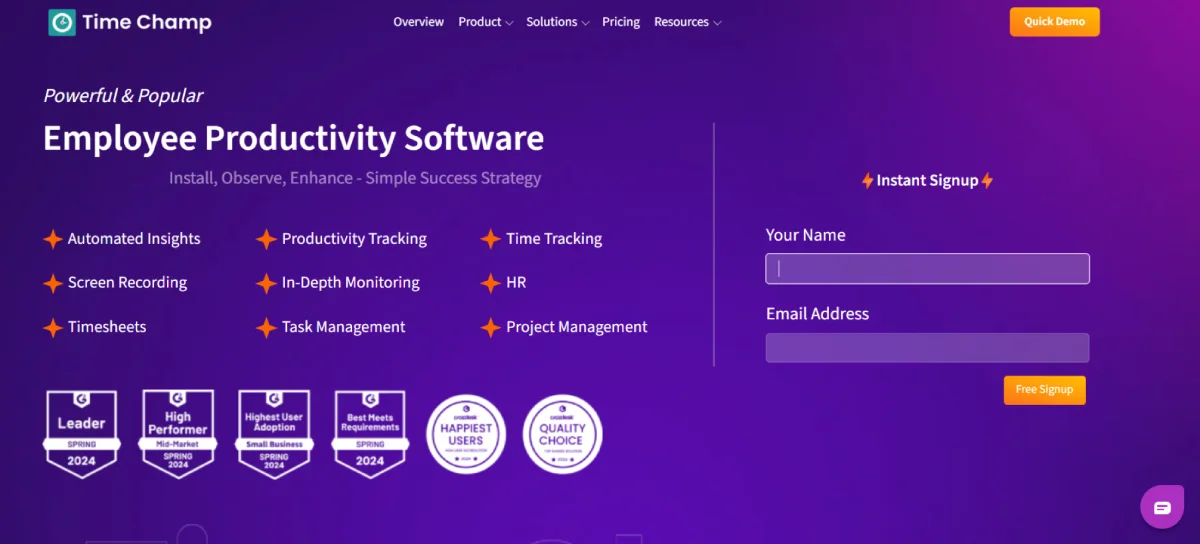
Time Champ is an all-in-one employee productivity and time tracking software designed for modern teams. It offers automated time tracking, real-time activity monitoring, attendance management, screenshots, project tracking, and detailed reports, all from a clean and user-friendly dashboard.
With strong analytics, integrations, and customizable features, Time Champ helps businesses streamline operations, boost accountability, and improve team performance, whether working remotely or in the office.
Key Features
- Automated Time Tracking Tracks work time in real-time without any manual entry, leading to accurate, error-free time logs.
- Productivity Monitoring Monitors app and website usage, idle time, and activity levels to help teams stay focused and efficient.
- Screenshots & Screen Recording Captures screenshots and optional screen recordings for full visibility into daily work.
- Project & Task Management Allows teams to assign tasks, track progress, and log hours against specific projects.
- Attendance & Shift Tracking Manages employee attendance, clock-in/out, and leave records and shift schedules on the same platform. It helps you automate attendance logs and plan shifts efficiently to ensure seamless workforce operations.
- Reports & Dashboards Provides detailed reports, visual insights into time usage, productivity, and project performance. You can also customize these reports while downloading or exporting from Time Champ.
- Integrations & API Connects with tools like Trello, Jira, Slack, and more to streamline workflows.
Pros:
- Easy to use with an intuitive interface
- Tracks productive and unproductive hours clearly
- Great for managing remote/hybrid teams
- Unlimited screenshots and screen recordings
- Responsive customer support
Cons:
- Occasional lags or data sync issues.
- Idle time tracking can mislabel meetings.
- Limited customization in the leave module.
Pricing
- 7-day free trial.
- Starter: $3.9/user/month
- Professional: $6.9/user/month
- Enterprise: $13.9/user/month
Ratings
2. Hubstaff
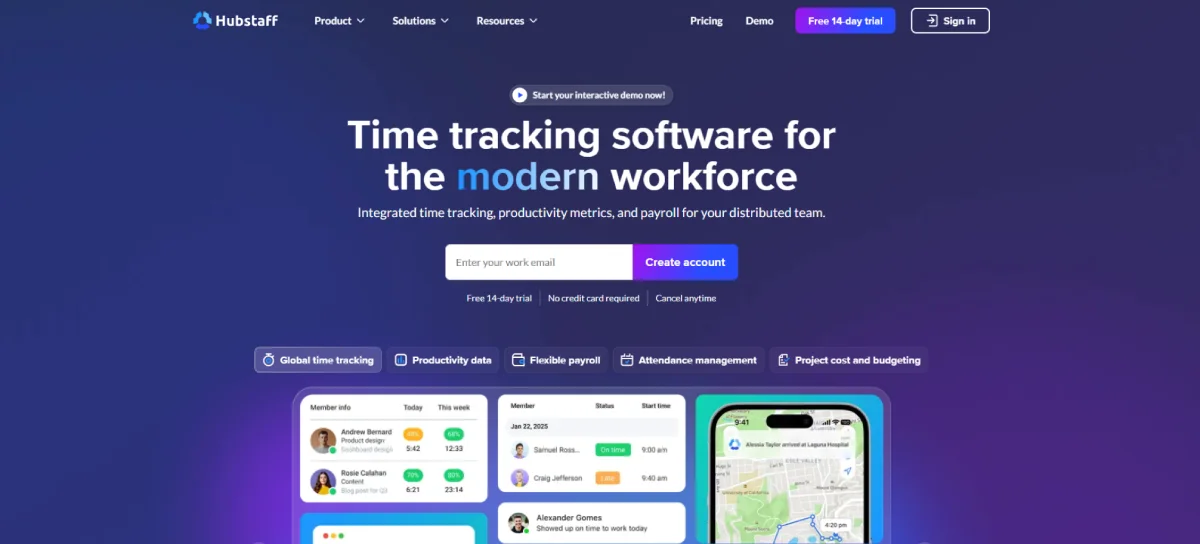
Hubstaff is an efficient workforce management tool built for remote, field, and hybrid staff. It also offers powerful time tracking, productivity tracking, GPS/geofencing on mobile users, as well as integrated payroll, invoicing and scheduling functions. Hubstaff is one of the leading services that allow transparency, accountability, and efficiency in different workplace environments.
Key Features
- Time tracking across desktop, web, and mobile
- Productivity monitoring with activity levels and screenshots
- GPS tracking and geofencing for field teams
- Automated timesheets and payroll integration
- Integrations with tools like Trello, Asana, Slack, and QuickBooks
Pros
- Simple and intuitive interface.
- Accurate time and location tracking.
- Strong support for remote and field teams.
- Seamless integrations with 30+ tools.
- Built-in payroll, invoicing, and scheduling.
Cons
- Can be expensive for small-sized teams.
- Limited offline functionalities.
- Occasional syncing or tracking delays may occur.
- Some features are only available on higher plans.
- Screenshot monitoring may raise privacy concerns.
Pricing
- 14-day free trial plan.
- Starter: $4.99/seat/month
- Grow: $7.50/seat/month
- Team: $10/seat/month
- Enterprise: $25/seat/month
Ratings
3. Toggl Track
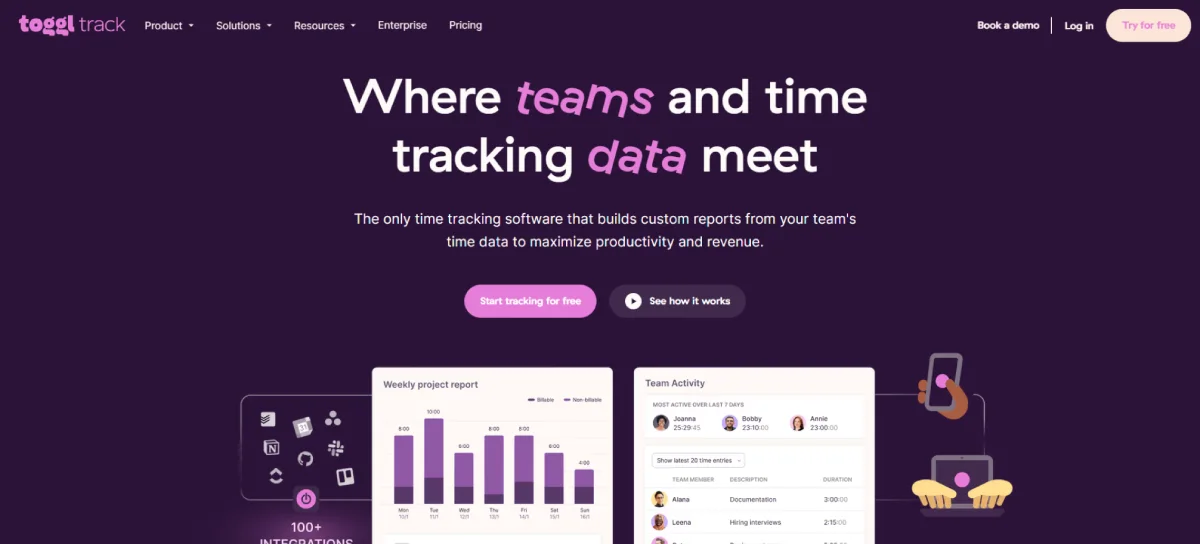
Toggl Track is a time tracking tool that helps individuals and teams record how they spend their work hours. It’s easy to use, works across devices, and provides useful reports to understand time spent on tasks and projects. It’s a good choice for those who want a simple way to stay organized and improve productivity.
Key Features
- One-click time tracking across web, desktop, and mobile
- Detailed reports for projects, clients, and tags
- Idle time detection to avoid inaccurate logs
- Offline time tracking with auto-sync
- Integrations with tools like Asana, Trello, and Slack
Pros
- Very easy to use with a clean interface.
- Offers a free plan up to 5 users.
- Great reporting and export options.
- Works across web, mobile, desktop, and browser extensions.
- Ideal for freelancers and small teams.
Cons
- No employee monitoring features like screenshots or keystrokes.
- Can get expensive for large teams on paid plans.
- Occasional syncing issues on mobile or desktop.
- Not ideal for companies needing advanced team management tools.
Pricing
- Free - $0/user/month: Ideal for up to 5 users
- Starter - $9/user/month
- Premium - $18/user/month
- Enterprise - Custom pricing
Ratings
4. Clockify
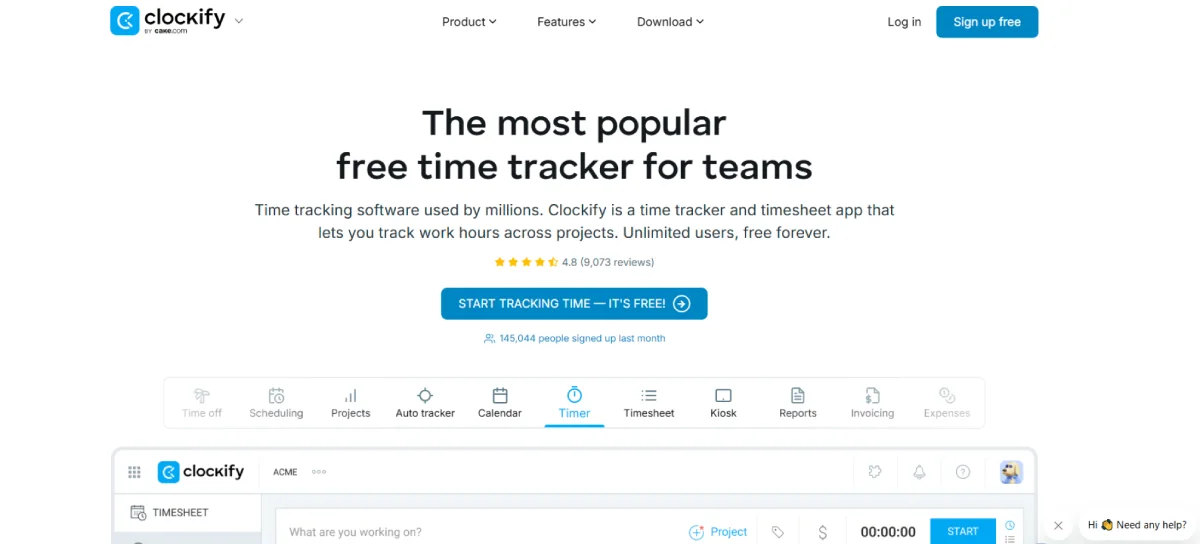
Clockify is a free, popular time tracking software designed to assist freelancers, teams and companies when it comes to keeping track of hours clocked in on various projects. It can support an unlimited number of users and entries, allows single-click time logging in desktop, web and mobile applications, provides extensive reporting on productivity, billing, schedules and employee attendance. While the free plan covers basic time tracking, access to advanced features like GPS tracking, and productivity insights requires an upgrade to a paid plan.
Key Features
- Time tracking across all the platforms.
- Customizable reports with filters and export options.
- Timesheets and calendar views for weekly scheduling.
- Billable hours, project budgeting, and time audits.
- Integrations with tools like Trello, Asana, Jira, Google Calendar, and more.
Pros
- Minimal learning curve.
- Clean and clutter-free design.
- Reliable time logging.
- Lightweight and fast.
Cons
- Lacks monitoring features.
- Limited support on the free plan.
- Reporting can feel rigid.
- No task-level progress tracking.
- UI feels outdated to some users.
Pricing
- Free: for limited time tracking features
- Basic: $3.99/user/month
- Standard: $5.49/user/month
- Pro: $7.99/user/month
- Enterprise: $11.99/user/month
Ratings
5. Time Doctor
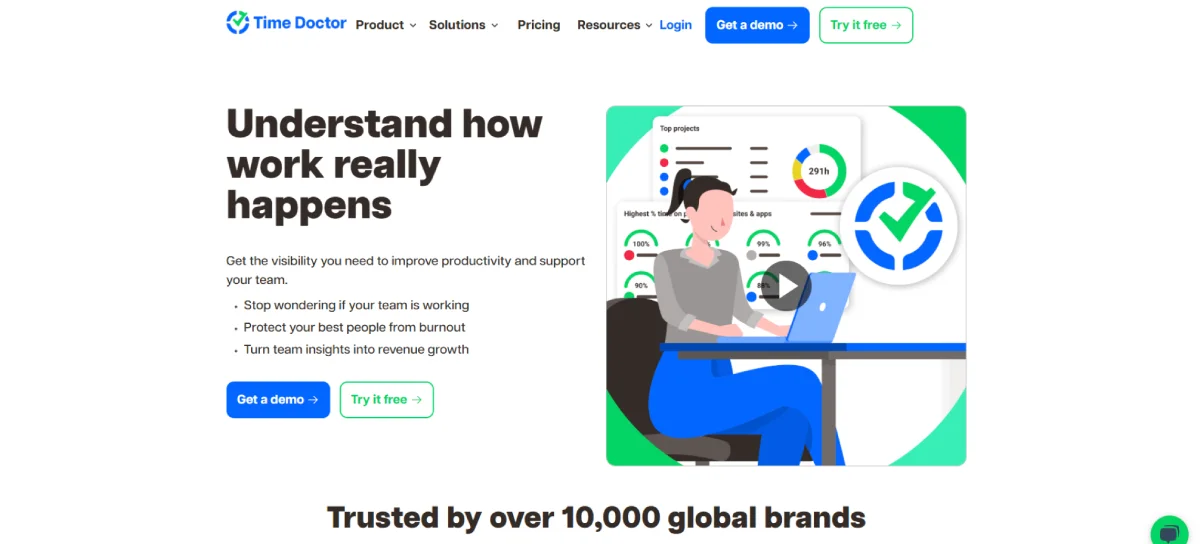
Time Doctor is a comprehensive time tracking and employee monitoring tool designed to help businesses boost efficiency and accountability. It records working hours, tracks website and app usage, takes optional screenshots, and integrates with popular tools like Trello, Asana, and QuickBooks. Ideal for remote and hybrid teams. Time Doctor gives detailed insights into how time is spent without interrupting workflow.
Key Features
- Time tracking with idle time detection.
- Screenshot and video recording for activity monitoring.
- App and website usage tracking with productivity categorization.
- Timesheets with payroll and invoicing integration.
- Project and task tracking with budget and cost estimation.
- Integrations with 60+ tools like Trello, Asana, Jira, and QuickBooks.
Pros
- Accurate time tracking with idle time detection.
- Boosts efficiency through activity insights.
- Screenshots and app tracking for better accountability.
- Integrates with tools like Trello, Asana, and QuickBooks.
- Built-in payroll and invoicing support.
Cons
- Can feel invasive due to screenshots.
- Mobile app may have sync or tracking issues.
- Lacks GPS and geofencing features.
- Some users feel that interface is outdated.
Pricing
- Basic: $6.70/user/month
- Standard: $11.70/user/month
- Premium: $16.70/user/month
- Enterprise: Custom pricing
Ratings
6. Activtrak
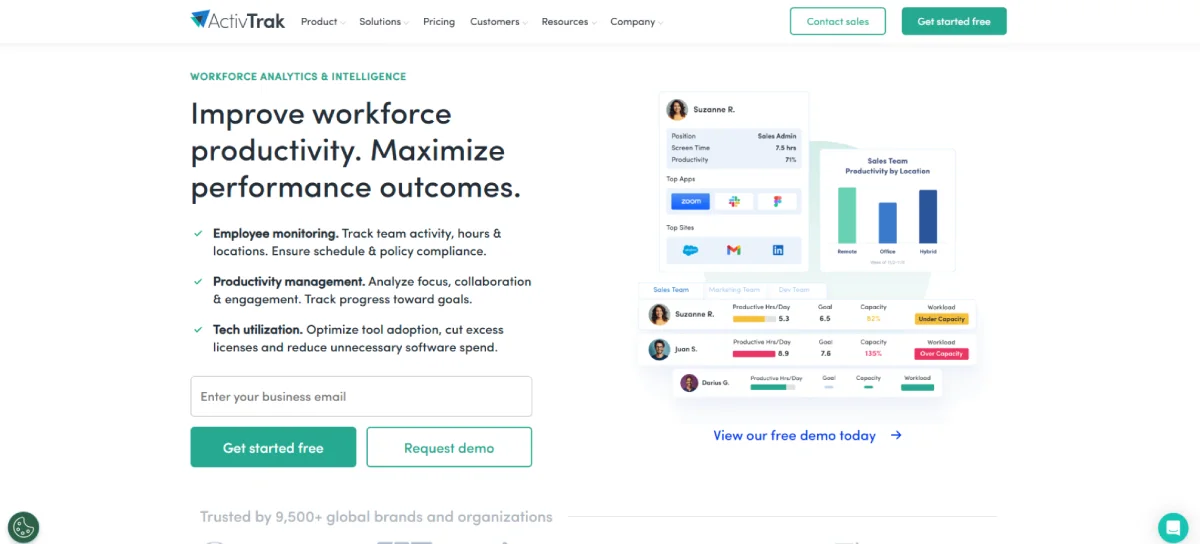
ActivTrak is a productivity and workforce analytics tool built to help business leaders understand teamwork without compromising employee privacy. It monitors user activity, gives visibility on productivity trends and helps managers in making data-driven decisions. In addition to its ability to monitor in real-time, AI-driven coaching, and detect burnouts, ActivTrak allows smarter and more productive workforce teams, particularly in remote and hybrid environments.
Key Features
- Real-time activity tracking (apps, websites, idle time)
- Productivity dashboards with trends and comparisons
- AI-based coaching and burnout risk detection
- Schedule adherence and attendance monitoring
- Integrations with Azure AD, Google Workspace, BI tools, and more
Pros
- Detailed activity insights.
- Easy to deploy and use.
- Granular visibility with screenshots.
- Strong monitoring for compliance and oversight.
- The free plan is valuable for small teams.
Cons
- Storage usage & slow screenshot retrieval.
- Complicated UI for new users.
- Annual pricing and licensing issues.
- Poor screenshot control & categorization.
Pricing
- Free: $0/user/month
- Essentials: $10/user/month
- Essential Plus: $15/user/month
- Professional: $19/user/month
Ratings
7. DeskTime
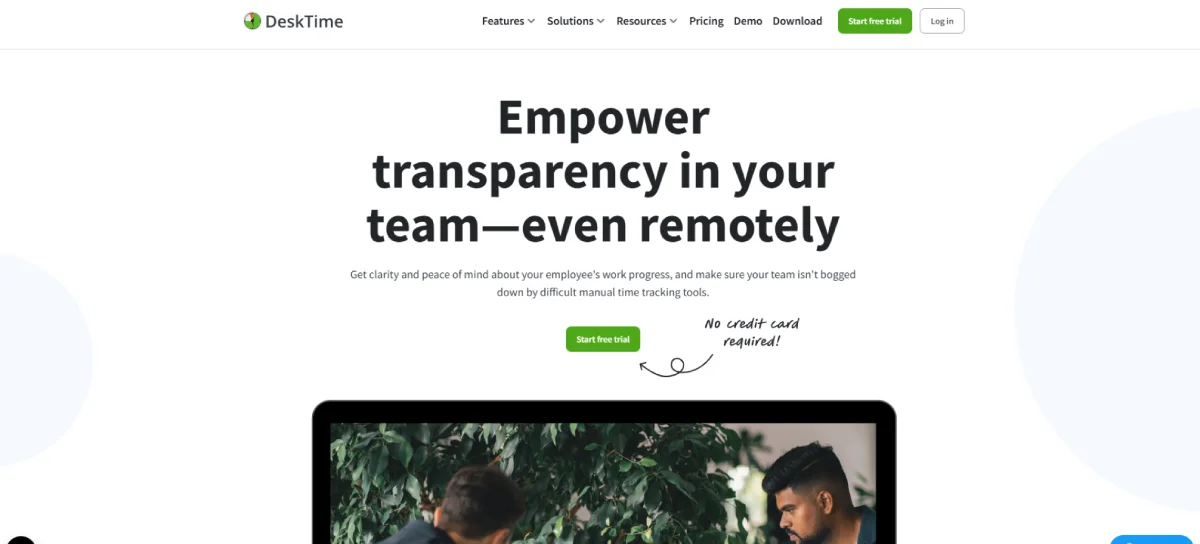
DeskTime is an automatic time tracking and productivity management software that is created to work with teams and freelancers. It monitors the use of apps and websites, records the working hours, and assists in making the process more productive by detecting unproductive habits. DeskTime is particularly effective in managing remote or hybrid teams since it has features such as screenshots, task tracking, and shift scheduling.
Key Features
- Automatic time tracking of apps, websites, and document titles.
- Categorization of productivity into productive, neutral, and unproductive.
- Screenshots for activity monitoring
- Task and project time tracking with cost estimation
- Shift scheduling, attendance tracking, and timesheets
- Mobile app support for field team tracking
Pros
- Starts tracking automatically without any manual input.
- Offers clear insights into productive vs. unproductive time.
- Easy to use with a clean, user-friendly interface.
- Useful features like Pomodoro timer and screenshots.
- Supports remote teams with scheduling and attendance tools.
Cons
- Idle time tracking can sometimes be inaccurate.
- Limited integrations compared to other tools.
- Customization options are minimal.
- The interface feels slightly outdated to some users.
Pricing
- Lite: $0/1 user
- Pro: $4.58/user/month
- Premium: $6.42/user/month
- Enterprise: Custom plans
Ratings
8. Insightful
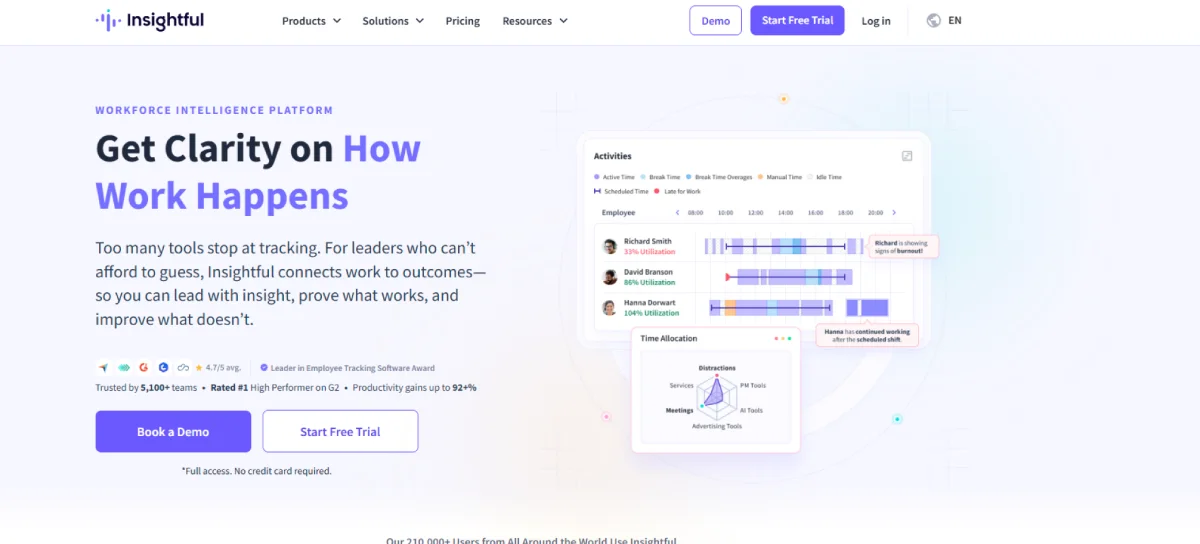
Insightful is a productivity-based employee monitoring and time-tracking tool without micromanagement. It has access to automatic work timers, app and website usage tracking, optional screenshots, with AI-driven insights to assist teams to optimize their workflows and avoid burnout, all while maintaining user privacy.
Key Features
- Real-time tracking of app and website usage.
- Automatic time mapping and project/task tracking.
- Productivity dashboards with trends, comparisons, and reports.
- AI-driven insights like burnout detection and workload balancing.
- Schedule adherence, attendance monitoring, and alert capabilities.
Pros
- Comprehensive activity insights.
- User-friendly interface and easy setup.
- Supports productivity tracking and reports.
- Customizable time tracking and reminders.
- Free tier is valuable for small teams.
Cons
- Occasional inaccuracies in activity tracking.
- The interface can be complex for new users.
- Limited reporting customization.
- No mobile app available.
- Stealth monitoring may raise privacy concerns.
Pricing
- 7 days free trial
- Productivity Management: $6.40/user/month
- Time Tracking: $8/user/month
- Process Improvement: $12/user/month
- Enterprise: Custom pricing
Ratings
9. Rescue Time
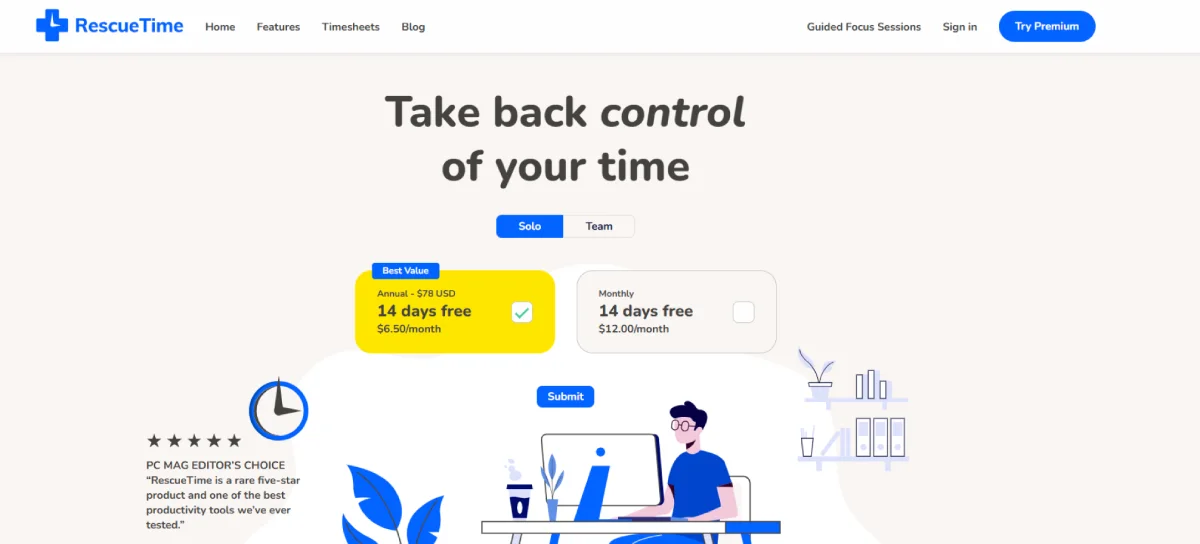
RescueTime is an automatic time-tracking and focus tool designed to provide more insight into how you work and how you can improve. It operates on the computer and mobile devices, tracking your digital activities and offering weekly reports, goal tracking and distraction blocking sessions to improve productivity and concentration.
Key Features
- Automatic tracking of apps, websites, and offline activities.
- Productivity scoring and goal setting.
- Focus Sessions to block distracting sites and apps.
- Detailed reports with time breakdowns and weekly summaries.
- Mobile app support with time logging and Focus Sessions.
Pros
- Automatic and insightful time tracking.
- Easy-to-use and intuitive dashboard.
- Distraction-blocking Focus Sessions.
- Custom goal setting and alert notifications.
- Weekly email summaries for accountability.
Cons
- Lacks team management and billing features.
- The mobile app tends to glitch.
- No screenshots or employee monitoring.
- API and integrations are limited.
- Users feel the interface is basic compared to modern tools.
Pricing
-
Individual Plans:
- Lite: Free
- Premium: $12/user/month
- Team Plan: $9/user/month
Ratings
10. My Hours
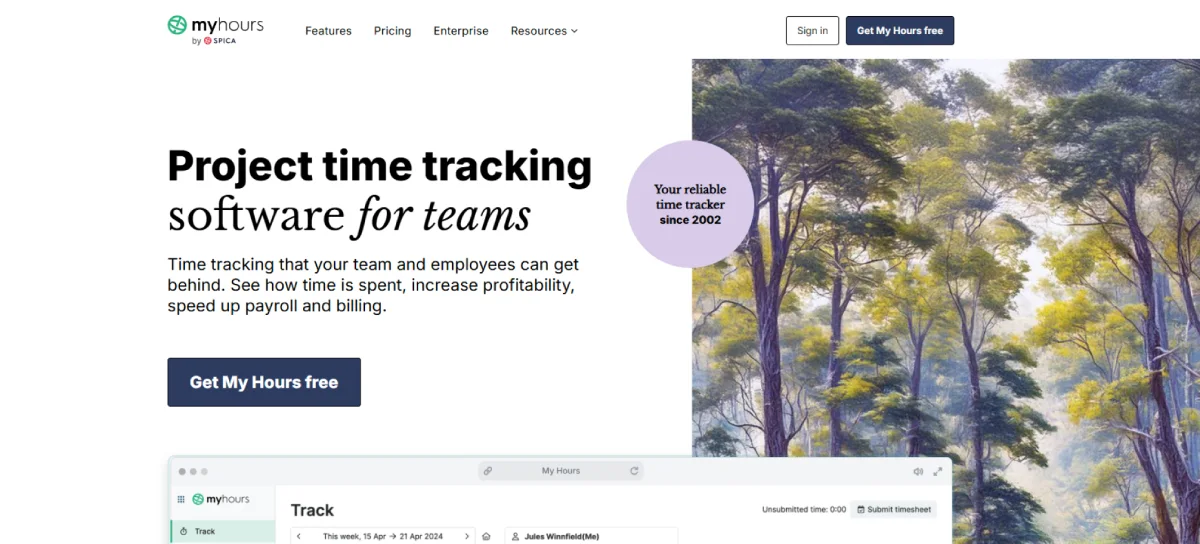
My Hours is a time tracking and invoicing solution, which is simple to use and project-based, ideally suited to freelancers, small teams and small businesses. It is user-friendly and allows users to track their billable hours, manage their tasks and generate reports with minimal configuration and a clear interface.
Key Features
- Create clients, projects, and tasks with flexible billing and budgeting.
- Track time with a timer or weekly timesheets, with reminders.
- Timesheet review and approval workflows for managers.
- Log expenses and create invoices directly from tracked data.
- Attendance tracking, absence logs, and payroll data export.
- Secure, cloud-based platform with API, Zapier, and Jira integrations.
Pros
- It is very simple to use and learn, even by non-technical users.
- Clutter-free and clean interface.
- Quick customer service and helpful tutorials.
- Great for freelancers and consultants with multiple clients.
- Highly rated on-the-go tracking mobile app.
Cons
- No screenshots or detailed activity tracking.
- Fewer integrations than competitors.
- Limited reporting flexibility.
- No built-in payroll features.
- The mobile app occasionally syncs slowly.
Pricing
- Free: $0 up to 5 users
- Pro: $8/user/month
- Enterprise: Custom Pricing
Ratings
How to Select the Right Software for Your Team's Needs?
The first step in selecting the appropriate software is to learn how your team works daily and what issues arise. In case your primary objective is to track your time precisely, you should find the tools that provide manual and automatic tracking. To analyze productivity, it is recommended to focus on such features as app/website usage, screenshots, or focus timers.
Ensure that the tool is user-friendly; your team should not need to spend hours trying to understand how it works. It is also important to see whether it will fit with your other tools, such as project management, payroll, or communication tools.
Privacy and openness are also important. Choose a software that does not cross the boundaries of the user yet provides useful insights. Lastly, compare the pricing plans, scalability and customer service. An effective trial period will allow you to try it with your team before deciding.
Conclusion:
While Desklog has strong features, it cannot meet the requirements of all teams. No matter what you are looking to improve on, whether it is tracking, reports, or integration, you will find an alternative tool that fits. Whether it's Time Champ’s all-in-one monitoring, My Hours’ intuitive simplicity, or RescueTime’s focus-boosting features, each tool brings unique strengths to the table. Make use of their free trials to explore which one aligns best with your team's workflow and productivity goals.
Frequently Asked Questions
Time Champ, Insightful, and ActivTrak are popular among remote teams due to real-time tracking, screenshots, productivity reports, and shift scheduling.
Yes. Many tools integrate with Trello, Asana, Slack, Jira, and others. For example, Time Champ, Hubstaff and Time Doctor offer extensive integration options.
Yes, many alternatives like Time Champ, Insightful, and ActivTrak offer screenshot capture, website/app usage tracking, and idle time detection.
Time Champ offers real-time tracking, productivity insights, automated attendance, screenshots, task management, and advanced reports, all in one platform.
Here are Some Related Articles You may Find Interesting

What is the Average Salary in Bangladesh: Overview & Insights
Discover The Average Salary in Bangladesh and outsourcing impact. Learn why it’s a rising player in global outsourcing.

Average Salary in India: Factors and Comprehensive Comparison
Discover the key factors influencing the average salary in India across industries, regions, and job levels, as well as insights.

What is the Average Salary in Colombia? & Factors Affecting
Discover the average salary in Colombia and explore the key factors affecting earnings, including industries, experience, and location. Find out.

What is the Average Salary in Indonesia?
Discover the average salary in South Africa and explore outsourcing trends. Learn key insights into wages, industries, and business opportunities.

What is the Average Salary in Hong Kong? and It’s Statistics
Learn about the average salary in Hong Kong, from minimum wage to maximum salaries, and gain insights into industry variations.

What is the Average Salary in Singapore: Economic Outlook
Discover the average salary in Singapore, key factors affecting income, insights into the nation’s economic outlook & explore its trends.
